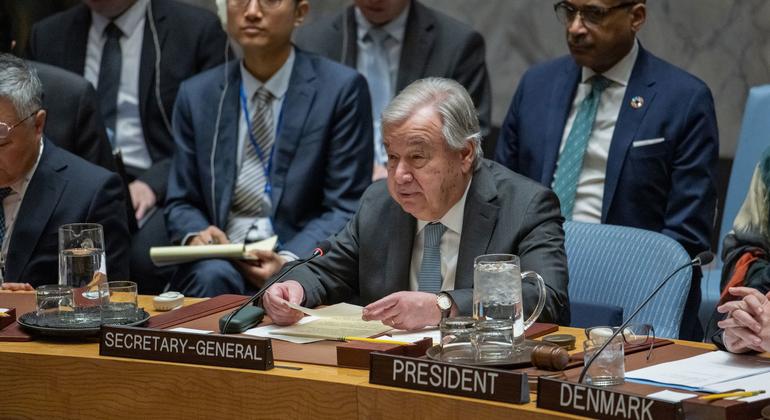The return of piracy, expanding trafficking, and cyberattacks on ports are turning the seas into high-risk zones. “Without maritime security, there can be no global security,” warned the UN Secretary-General on Tuesday, calling on states for a collective response to the growing threats.
During a Security Council debate on maritime security, UN Secretary-General António Guterres emphasized humanity’s deep reliance on oceans and seas—not only for their biodiversity and oxygen production but also for trade and geopolitical stability. “Maritime routes connect the world” and have “always been the main channels of commercial exchange,” he highlighted.
Crime, Conflicts, and Regional Tensions
However, these crucial maritime routes are now increasingly vulnerable. “Challenges linked to disputed borders, depletion of ocean resources, and escalating geopolitical tensions fueling competition, conflicts, and crime,” were outlined by Guterres. The Security Council has already addressed several of these threats: “Piracy, armed robbery, trafficking, organized crime […] and maritime terrorism.”
The statistics are alarming. After a dip in 2024, piracy acts are rising sharply again. According to the International Maritime Organization (IMO), attacks have increased by nearly 50% compared to the previous year at the same time. “In Asia, they have nearly doubled,” Guterres noted.
The Strait of Malacca and Singapore, the Red Sea, the Gulf of Aden, and the Gulf of Guinea are now hotspots for illicit activities including migrant trafficking, illegal fishing, and smuggling of oil, weapons, and drugs.
Transnational networks are also under scrutiny. “Heroin from Afghanistan continues to arrive in East Africa via the Indian Ocean. Cocaine crosses the Atlantic from the Americas to reach West Africa and European ports,” described the Secretary-General. A more recent threat is cyberattacks targeting ports and shipping companies.
“A distress signal is coming from the world’s maritime routes and the populations depending on them,” he summarized.
A Call for Cooperation
To address these threats, António Guterres stressed the need to act in three areas: respect for international law, tackling the root causes of maritime insecurity, and strengthening partnerships at all levels.
“Respect for international law is the primary condition for maritime security,” he affirmed, recalling that the UN Charter and the Law of the Sea Convention form an essential framework. “However, their effectiveness depends on states’ willingness to fully implement them.”
Substantively, the Secretary-General advocated a comprehensive approach addressing the roots of crime at sea: poverty, fragile governance, and lack of livelihoods. “Maritime security threats cannot be resolved without also confronting poverty, lack of livelihoods, insecurity, and weak governance structures.”
Fragmented Progress
The UN and its agencies support various regional initiatives from West Africa to Asia. The interregional mechanism of the Yaoundé Architecture, set up to secure the Gulf of Guinea, helped reduce piracy incidents from 81 in 2020 to only 18 in 2024. “The International Maritime Organization also continues to play a fundamental role,” Guterres noted, praising projects to build local capacities, provide judicial assistance, and modernize naval forces.
But to fully meet the urgent challenges, broader cooperation is essential. “We must involve all stakeholders concerned with maritime spaces in the response,” insisted the UN chief. Governments, shipowners, insurers, civil society, and coastal communities all must be part of the solution.
Women and girls, disproportionately affected by piracy and trafficking, should also be priorities. “As threats become more complex and interconnected, improving coordination and strengthening maritime governance is critical.”
A Call to Action in Nice
Finally, Guterres urged member states to make the upcoming UN Ocean Conference, scheduled in Nice from June 9 to 13, a turning point. “The next Ocean Conference […] will be a decisive opportunity for countries worldwide to take action.”
In conclusion, the Secretary-General reaffirmed the UN’s commitment: “The United Nations system stands ready to continue supporting this Council and all Member States in ensuring peaceful, secure, and prosperous maritime spaces for generations to come.”


